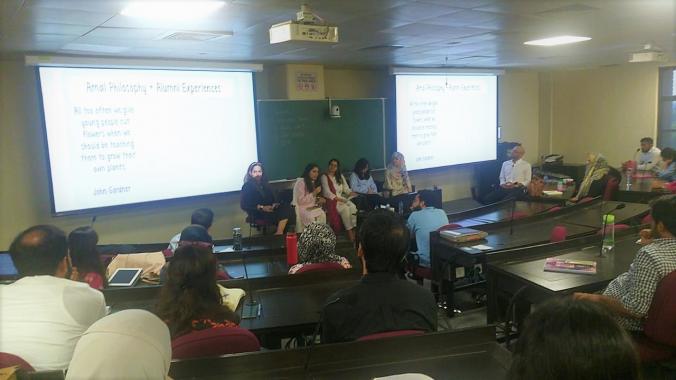
On September 19, 2019, the Syed Ahsan Ali and Syed Maratib Ali School of Education (SOE) had the pleasure of hosting the dynamic team of practitioners from Amal Academy as part of SOE’s Models of Educational Innovation series.
Amal Academy is a platform that is supported by Stanford University, USA. The goal of the three month Amal Fellowship is to prepare graduating university students for the workplace, specifically by enabling them to develop their professional and business skills (e.g. communication, teamwork, leadership, and problem-solving). The Fellowship focuses not only on developing the skills needed to enter the job market, but also on lifelong skills needed to excel once they are on the job. So far, Amal Academy has graduated over 3,700 fellows from 113 batches. Amal Fellows enjoy an 80% job offer rate within three months from the end of their fellowship.
The session was led by Benje Williams, CEO and Co-founder of Amal Academy. Mr. Williams completed his Bachelors from the University of California, Berkeley and his Masters in Business Administration (MBA) from Stanford University. Mr. Williams has previous experience working with Acumen Fund in Pakistan, Kenya and India, PricewaterhouseCoopers in New York, Dalberg in South Africa, and TechnoServe in Kenya. He was joined by his colleagues Ali Siddiq and Wajieha Waheed, who moderated breakout discussions during the interactive session.
The session began with an icebreaking activity, in which SOE students exchanged stories about the origin of their names. The objective of the activity was to underscore the importance of peer to peer learning, which is a fundamental practice at Amal. Mr. Williams explained that the name Amal itself means ‘to take action’ in Urdu, and this is the heart of the organisation’s core values.
He also shared the history of Amal; it began its operations in 2015 in Pakistan with grant funding from Stanford University. It primarily operates in the public sector space with the aim to bridge the gap between public sector universities and the skills needed to join the workforce. Apart from technical skills, the curriculum at Amal focuses on developing a growth mind-set among its Fellows and inculcating values such as self-efficacy and grit. This ties in with the organisation’s objective of promoting lifelong learning and social responsibility in Amal Fellows.
The audience then had the opportunity to hear from Amal programme managers, as well as Amal Fellows who are part of the current student body at SOE. Each panel member shared an experience from their time at Amal and the important leadership lessons that they came away with. Shajia Shoaib, an MPhil ELM student, said that the lesson she learned is best described by Professor Greg Dees, an internationally recognised scholar in social entrepreneurship, who said, “Never do for a student, what they can do for themselves”. She shared that this showed her the importance of cultivating growth in her students and to foster growth from within.
The event ended with an interactive discussion on six problems of practice that Amal Academy is currently thinking about, in the broad areas of alumni engagement, scaling up operations, measuring learning outcomes (particularly in the development of soft skills), improving the gender balance in recruited fellows, promoting a growth mind-set within the Amal team and providing more autonomy to their facilitators.








